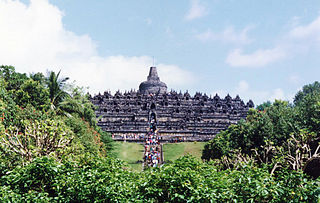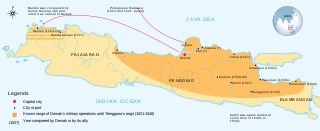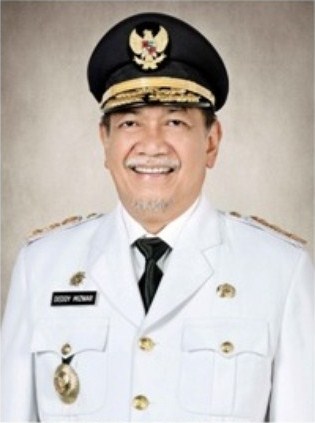
The Wali Songo are revered saints of Islam in Indonesia, especially on the island of Java, because of their historic role in the spread of Islam in Indonesia. The word wali is Arabic for "trusted one" or "friend of God", while the word sanga is Javanese for the number nine.

Sunan Kalijaga was one of the "nine saints" of Javanese Islam. the "Kalijaga" title was derived from an orchard known as "Kalijaga" in Cirebon. Other accounts suggest the name derives from his hobby of submerging himself in Kali. Others note that the name Kalijaga derived its nature from the Arabic notion of qadli dzaqa which means "holy leader" in the sultanate.
Sunan Gunungjati (1448–1568) was one of the Wali Songo, or nine saints of Islam revered in Indonesia. He founded the Sultanate of Banten, as well as the Sultanate of Cirebon on the north coast of Java.
Sunan Kudus, founder of Kudus, is considered to be one of the Wali Sanga of Java, Indonesia.

Sunan Giri, Muhammad Ainul Yakin (born 1442 CE in Blambangan is considered one of the Wali Sanga of Indonesia.
Tombo Ati is a traditional Javanese song composed by Sunan Bonang, one of Wali Sanga, from Tuban, East Java. The song is about a Muslim's ways of gaining spiritual peace and tranquility, through tahajjud, reciting the Qur'an, fasting, gathering with pious people, and in constant remembrance of god, all of which are considered to be "Remedies for the Heart".

The Demak Sultanate was a Javanese Muslim state located on Java's north coast in Indonesia, at the site of the present-day city of Demak. A port fief to the Hindu-Buddhist Majapahit kingdom thought to have been founded in the last quarter of the 15th century, it was influenced by Islam brought by Muslim traders from China, Gujarat, Arabia and also Islamic kingdoms in the region, such as Samudra Pasai, Malacca and Bani (Muslim) Champa. The sultanate was the first Muslim state in Java, and once dominated most of the northern coast of Java and southern Sumatra.
Sunan Bonang was one of the Wali Songo, along with his father Sunan Ampel and his brother Sunan Drajat.
Sunan Ampel was one of the Javanese nine revered saints Wali Songo, credited for the spread Islam in Java. According to local history around Demak the mosque of Demak Masjid Agung Demak was built by Sunan Ampel in 1479 CE, but other source credited the construction of the mosque to Sunan Kalijaga.
Sunan is the shorter version of "Susuhunan", both used as an honorific in the island of Java, Indonesia.

Deddy Mizwar is an Indonesian actor, film director and politician, born of an Indo (Dutch-Betawi) father and Betawi-Bugis mother. He is the Chairman of Indonesia's National Film Advisory Board and former Vice Governor of West Java. He also ran for governorship of the province in the 2018 election. His 2010 film How Funny was selected as the Indonesian entry for the Best Foreign Language Film at the 83rd Academy Awards, but it didn't make the final shortlist.

Babad Tanah Jawi, is a generic title for many manuscripts written in the Javanese language. Their arrangements and details vary, and no copies of any of the manuscripts are older than the 18th century.
Sunan Muria is, according to the Babad Tanah Jawi manuscripts, one of the Wali Sanga involved in propagating Islam in Indonesia.
Sunan Drajat was born in 1470 CE. He was one of the Wali Songo or "nine Saints", along with his father Sunan Ampel and his brother Sunan Bonang.
Ali al-Uraydi ibn Ja'far al-Sadiq, better known simply as Ali al-Uraydi, was the son of Ja'far al-Sadiq and the brother of Isma'il, Musa al-Kazim, Abdullah al-Aftah, and Muhammad Al-Dibaj. He was known by the title al-Uraydi, because he lived in an area called Urayd, about 4 miles from Medina. He was also known by the nickname Abu al-Hasan.

Sunan Giri Mosque is located near Gresik about 45 kilometres from the Indonesian city of Surabaya. Its pavilion shelters the tomb of Sunan Giri, one of the nine Muslim saints of Java, and like the tombs of the other wali sanga, it is a significant and highly auspicious pilgrimage point. This site is often referred to as Giri Kedaton.

Sunan Ampel State Islamic University Surabaya, also abbreviated as UIN Sunan Ampel, is one of the state Islamic universities in Indonesia based in Surabaya which organizes multidisciplinary Islamic education as well as secular education including science and technology. The university has history of cultivating the intellectual background for Islamic movements and organizations, especially for Nahdlatul Ulama. UIN Surabaya is named after Sunan Ampel, one of Wali Sanga, the legendary Sufi figures who greatly contributed to the spread of Islam in Indonesia.
Sunan Gunung Djati State Islamic University Bandung, also known as UIN Bandung or often abbreviated as UIN SGD, is a state Islamic university based in Cibiru District, Bandung, West Java. The university has a history of cultivating the intellectual background for Islamic movements and organizations, Nahdlatul Ulama. The university is named after Sunan Gunungjati, who was one of the Wali Sanga, the legendary Sufi figures who contributed greatly to the spread of Islam in Indonesia.

Islam is the most adhered religion in East Java, a province of Indonesia, embraced by 96.7% of the whole population. Throughout the history, East Java has been considered one of the heartlands of Islam in Indonesia, where seen one of the earliest proliferation of Islam, and the establishment of the largest Islamic mass organization in Indonesia, Nahdlatul Ulama.
Sunan Dalem, whose real name was Sheikh Maulana Zaenal Abidin, is a Wali propagator of Islam from Gresik, East Java. He is known as the successor to the second Sultanate of Giri Kedaton since 1506, after his father Sunan Giri died. Sunan Dalem's role in the spread of Islam included the construction of a mosque with a three-story roof, which is now called the Tiban Mosque. He died in 1545, but the unique tradition of eating Chicken compote during the 23rd of Ramadan (Sanggiring) inherited from Sunan Dalem is still carried out by the local community until now.